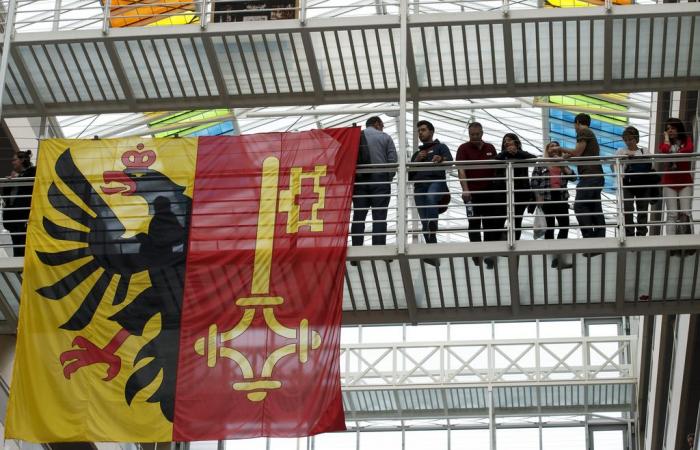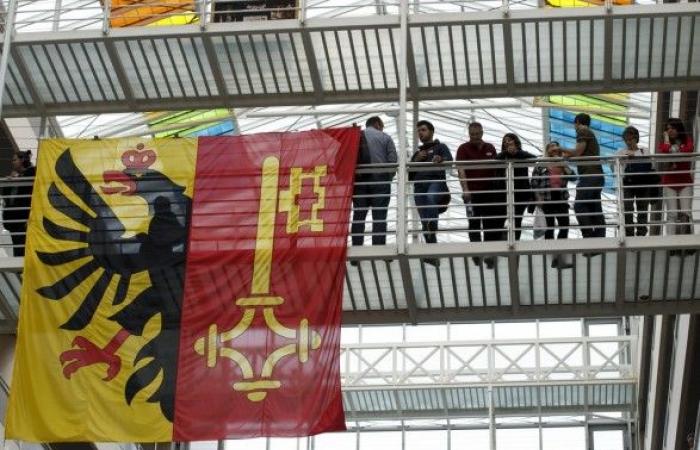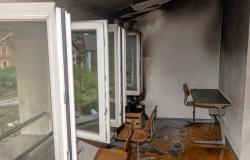While some see this phenomenon as proof of democratic and citizen integration, others express concerns concerning a possible political instrumentalization and manipulations of the electoral process
Monday, 5 can 2025 – 18:22 Zamira Bytyçi

Keystone
The strong electoral mobilization of the Albanian community in Vernier, Meyrin and Onex (Geneva) aroused a lively public and political debate in Switzerland. If some see this phenomenon as proof of democratic and citizen integration, others express concerns about possible political instrumentalization and manipulations of the electoral process.
Sean Müller, professor at the University of Lausanne and expert in direct democracy and federalism, positively judges this mobilization by declaring: “Any strategy that encourages citizens to exercise their right to vote is welcome, because increased participation strengthens legitimacy and political stability”. He explains that migrant communities, seeing better political representation, feel more integrated and recognized in Swiss society. Müller warns, however, against an excessive focus on ethnicity or culture, risking reducing flexibility and the natural dynamism of the political debate.

Müller insists that transparent and spontaneous electoral mobilization is positive for democratic integration. However, it warns that if mobilization is exclusively focused on cultural or ethnic origins, it could become problematic. To avoid this, Müller proposes that local authorities will endorse a clear and transparent framework for the elections, while actively promoting intercultural dialogue and social cohesion.
Dorina Xhixho, former member of the Management Committee of the Geneva Socialist Party, raised serious concerns and confirmed her resignation in connection with this case. Xhixho denounces the silence and the lack of reaction of the PS management bodies in the face of the accusations against the Albanians to practice a “community vote”. According to her, “the lack of a clear reaction of the PS has favored the stigmatization and delegitimation of the Albanians”. She also stresses that the dominant mentality within the PS has never allowed a real representation of minorities, particularly of the Albanophone community.
Xhixho strongly criticizes the gap between the PS official discourse on equality and integration and internal reality of the party, where discrimination and structural racism remain major obstacles. It evokes precise examples, such as the elections for the Council of State of the Canton of Geneva in 2017, where the candidate Thierry Apothoz was unfairly accused of “massive mobilization” of Albanian via the memberships in the Vernier section, where he was an administrative advisor. A similar situation also occurred during the 2024 elections for the administrative council of the city of Geneva, where approximately 25 memberships, mainly immigrants, including 5 to 6 Albanians, were unjustly suspended to prevent an alleged “community vote”. The PS, far from reacting, even fueled this negative rhetoric in the media.
Xhixho also describes the pressures and intimidation suffered personally after raising these questions within the party, including repercussions on his private and professional life. An internal survey finally revealed that the suspension of memberships was unfounded. Xhixho considers this case as a clear example of political hypocrisy and double standard.
In his public letter of resignation, Xhixho expresses his deep disappointment towards the PS, which traditionally benefits from large support from immigrant communities, but which has not reacted firmly in the face of these internal discrimination, thus contributing to a general climate of mistrust towards the political participation of the Albanians.
Sandro Cattacin, professor at the University of Geneva, underlines the importance of this electoral mobilization as a positive step towards democratic integration. He explains that the choice of candidates based on common origins is a common and normal practice in democracy, comparing this to the vote in favor of women. Nevertheless, he warns that the risk of instrumentalization becomes real when community belonging becomes the central criterion of the electoral choice.
Cattacin insists on the responsibility of local authorities and political parties to adopt precise measures to avoid discrimination and negative instrumentalization. He notably proposes the introduction of an anti -racist education in schools, continuous training for staff of public administrations on respect for cultural diversity, and clear policies promoting recruitment reflecting the real diversity of the local population. According to him, these measures would not only strengthen integration, but also social cohesion and the confidence of different communities towards public institutions.
Leonard Feraiti, a socialist deputy in Geneva, strengthens this positive perspective by considering this mobilization as a sign of political maturity within the Albanian community. He firmly rejects any stigmatization and criminalization of the Albanians, judging that the unfounded accusations of manipulation reflect a political fear than a founded reality. Will add that the Albanian community simply exercises its democratic law and is perfectly capable of choosing its representatives according to their skills and their political programs.
In conclusion, this electoral mobilization must be perceived as a positive and important sign of democratic integration, while the problems linked to instrumentalization and stigmatization require a prudent and inclusive approach on the part of political parties and Swiss society as a whole, in order to maintain social cohesion and strengthen local democracy.














